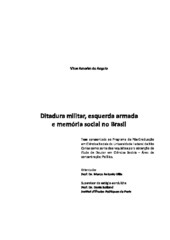Ditadura militar, esquerda armada e memória social no Brasil
Abstract
The thesis discusses the relationship between the Brazilian s military dictatorship and the armed left in the years 1960-70 and its effects on the social memory about that period. The preparation of the 1964 coup and the structuring of the military regime are often attributed to the National Security Doctrine (DSN), which would have be the rational basis of the action and the thought of the Brazilian military. From this point of view, build an efficient information-repressive apparatus would result by the DSN s guidelines. However, as the thesis demonstrates, the armed left never represented a real threat to the dictatorship. Using precisely the guerrillas as a justification for the intensification of the regime, part of the Armed Forces tried to impose on other military trends. Later, when the social memory about the military period began to be built, the armed left appeared as responsible for the end of the dictatorship, when we know that the regime was the one who gained strength in the combating of guerrillas. The establishment, consolidation and reproduction of this and other myths about the old left armed occurred during the amnesty mobilization, in the late of the 1970 s, and the Diretas Já!, in the next decade, when the former guerrillas have been in contact with several sectors society that opposed the dictatorship and fought for the return of democracy.
